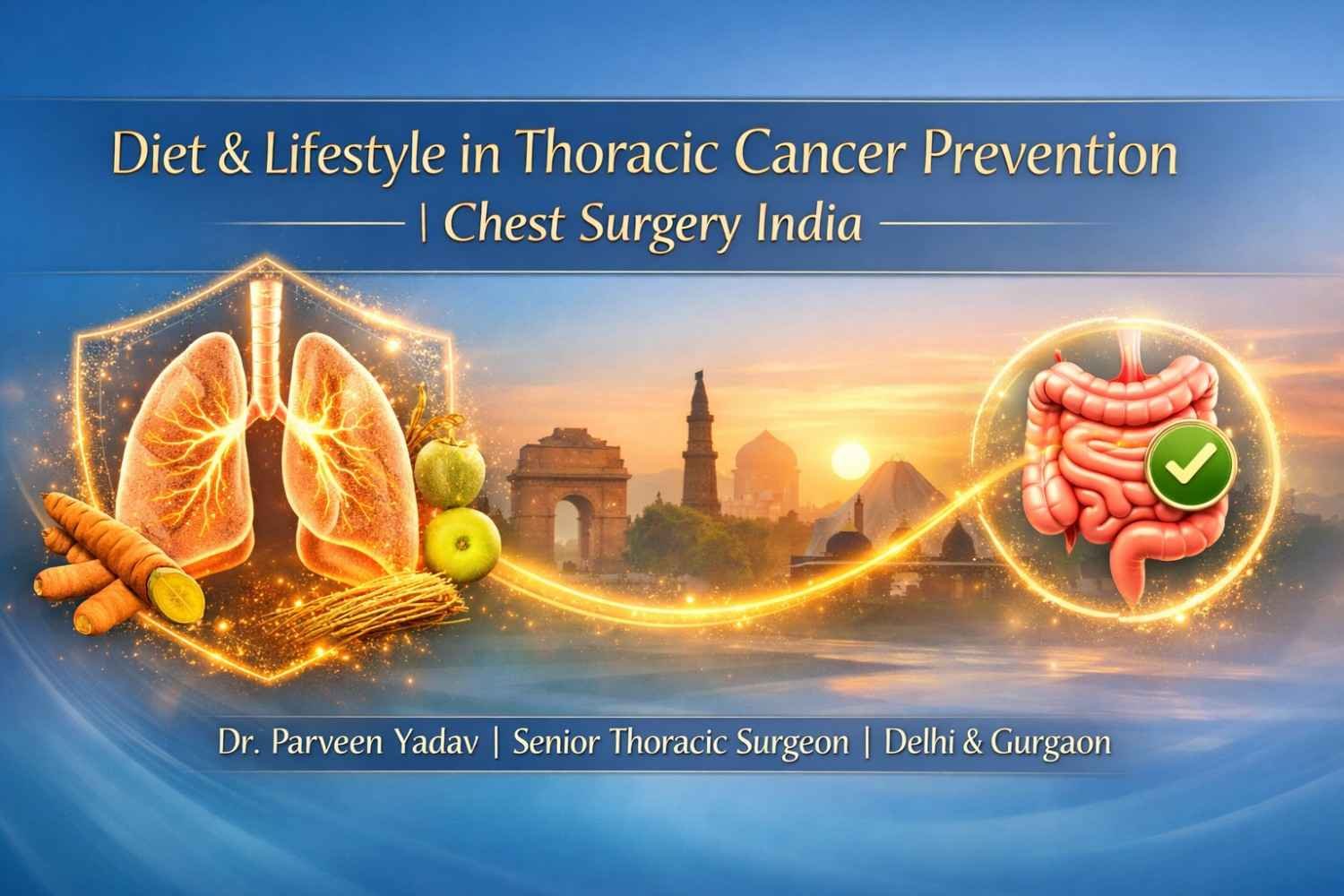

A persistent cough can be exhausting and anxiety-inducing. As a thoracic surgeon with over 20 years of experience treating lung conditions, I, Dr. Parveen Yadav (MBBS, MS (General Surgery), FAIS, FAIGES, Surgical Oncology, AIIMS), understand how unsettling it can feel when a cough lingers for weeks. Many patients ask me, “Could this be lung cancer?” Let me reassure you: most persistent coughs are not cancer. However, it’s my duty to emphasize that ignoring certain warning signs can delay life-saving interventions.
At Chest Surgery India, my team and I prioritize early detection. Why? Because lung cancer, when caught early, is far more treatable. A cough that lasts for months, changes in character, or appears alongside other symptoms like blood in phlegm deserves attention. Whether you’re a smoker, have a family history, or are simply concerned about your health, this blog will help you distinguish between a harmless cough and one that needs expert evaluation.
In my clinical practice, I define a persistent cough as one lasting three weeks or longer. Let me break this down for you:
You might experience:
As someone who has Cured thousands of patients, I’ve noticed that coughs linked to lung cancer often feel “different.” They may worsen over time, produce rust-colored or bloody mucus, or occur with unexplained weight loss. But remember: most chronic coughs have simpler explanations. Allergies, pollution, or even stress can trigger them. My advice? Don’t panic—but don’t ignore red flags either.
In my years of practice, I’ve seen countless patients troubled by a cough that won’t go away. Let me reassure you: most chronic coughs are not linked to lung cancer. Here are the usual suspects:
While the above causes are far more common, a cough tied to lung cancer may:
A patient once came to me with a 10-week cough he blamed on Delhi’s pollution. Tests revealed early-stage lung cancer. His timely visit saved his life. Moral? Don’t assume—get clarity.
As a surgeon, I urge you to watch for these red flags:
A typical cough improves with rest, hydration, or basic medications. A cancer-related cough feels relentless, evolves over weeks, and may come with fatigue or appetite loss.
I recall a non-smoker in her 40s who dismissed her “harmless” cough for months. By the time she consulted us, the cancer had spread. This is why early evaluation is non-negotiable.
If you’re thinking, “But I don’t smoke!”
While smoking is a top risk factor, 20% of my lung cancer patients never smoked. Air pollution, genetic factors, or exposure to asbestos/radon can also play a role.
Over my career, I’ve observed that lung cancer doesn’t discriminate—it can affect anyone. However, certain factors raise the risk significantly. Let’s break them down:
Absolutely. Last year, I treated a 32-year-old teacher who never touched a cigarette. Tests revealed stage 1 lung cancer linked to air pollution (she commuted daily on Delhi’s roads). Another patient, a homemaker, developed it due to secondhand smoke from her husband.
My Advice:
If your cough raises concerns, here’s what to expect during evaluation at our center:
Step 1: Detailed Consultation
We discuss your medical history, cough patterns, and risk factors. Honesty is key—don’t hide smoking habits or family history.
Step 2: Imaging
Step 3: Biopsy
If scans show suspicious growths:
Step 4: Molecular Testing
We analyze the tumor’s genetic makeup to identify targeted therapies (e.g., for EGFR or ALK mutations).
Why Choose Us?
A recent case: A 55-year-old farmer with a 12-week cough assumed it was a “dust allergy.” CT scan revealed a 1.8 cm tumor. We performed a biopsy, confirmed stage 1 cancer, and removed it surgically. He’s now cancer-free.
If tests confirm lung cancer, know this: modern medicine offers hope. At Chest Surgery India, we tailor treatments to your unique condition. Here’s what you need to know:
Success Story:
A 45-year-old non-smoker with stage 3B lung cancer received immunotherapy combined with radiation. Scans after 6 months showed no active disease. Today, she’s back to teaching yoga.
My Promise:
We don’t just treat cancer—we treat you. From nutrition plans to emotional support, our team ensures you never feel alone.
Preventing lung cancer starts with awareness. Let’s discuss steps you can take today:
A Cautionary Tale:
A 58-year-old farmer from Punjab ignored his “smoker’s cough” for years. By the time he visited us, the cancer had spread. Don’t wait for symptoms to escalate.
Trust your instincts. If you cough:
Act Now, Not Later:
At Chest Surgery India, we’ve saved lives because patients came in early. A 3 mm tumor found on a routine scan took just 30 minutes to remove. The patient left the hospital the next day.
“Don’t gamble with your health. If a cough worries you, reach out to my team at Chest Surgery India. We offer same-week appointments and cutting-edge diagnostics. Early action can make all the difference.” – Dr. Parveen Yadav.
Most persistent coughs are not lung cancer. But as someone who’s seen the consequences of delay, I urge you: Never ignore red flags. Modern treatments work best when cancer is caught early.
Whether you smoke or not, live in a city or village, your lungs deserve care. At Chest Surgery India, we combine expertise with empathy to guide you from fear to clarity. Remember: A cough is your body’s way of signaling—listen to it.

18+ Yrs Exp | 5,700+ Thoracic & Robotic Cancer Surgeries
Dr. Parveen Yadav is a Director and Senior Consultant in Thoracic and Surgical Oncology, specializing in minimally invasive and robotic lung and esophageal surgeries, with advanced training from AIIMS and Tata Memorial Hospital.
View Full Profile Pain After Thoracic Surgery: Tips for Smooth Recovery
Pain After Thoracic Surgery: Tips for Smooth Recovery
 Diet & Lifestyle for Thoracic Cancer Prevention | Dr. Parveen Yadav
Diet & Lifestyle for Thoracic Cancer Prevention | Dr. Parveen Yadav
 Robotic Thoracic Surgery: How Da Vinci Technology is Revolutionizing Chest Procedures
Robotic Thoracic Surgery: How Da Vinci Technology is Revolutionizing Chest Procedures
Struggling with pain after chest surgery? Dr. Parveen Yadav shares expert recovery tips, causes of shoulder pain, PTPS signs, and what your discharge sheet won't tell you.
Discover how diet, breathing exercises & daily habits help prevent and recover from thoracic cancer. Expert insights from Dr. Parveen Yadav, Chest Surgery India
Discover how Da Vinci robotic surgery is transforming chest procedures in Gurgaon. Less pain, faster recovery & expert care by a certified thoracic surgeon
Copyright 2026 © Dr .Parveen Yadav all rights reserved.
Proudly Scaled by Public Media Solution!